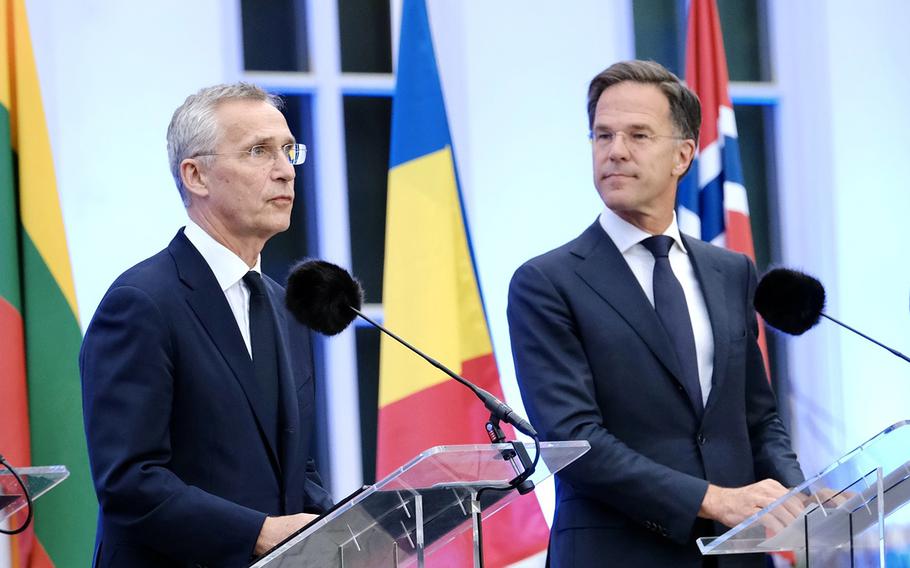
NATO Secretary-General Jens Stoltenberg, left, and Dutch Prime Minister Mark Rutte appear at a news conference in The Hague, Netherlands, in June 2023. Rutte has emerged as the front-runner to replace Stoltenberg after winning endorsements from the United States and Germany. (NATO)
The prime minister of the Netherlands, a country that has long failed to hit NATO’s defense spending benchmark, has emerged as the front-runner to lead the alliance after winning endorsements from the United States and Germany.
Should Dutch Prime Minister Mark Rutte win support from the rest of 31-nation bloc, later this year he will replace Secretary-General Jens Stoltenberg, who has held the position for a decade.
“The United States has made it clear to our allies, our NATO allies, that we believe Mr. Rutte would be an excellent secretary-general for NATO,” National Security Council spokesman John Kirby told reporters Thursday.
The United Kingdom and Germany also publicly announced support for Dutch leader.
“Mark Rutte’s immense experience, extensive security policy expertise and profound diplomatic skill make him an outstanding candidate for the position,” German Chancellor Olaf Scholz’s office said in a statement Thursday.
The selection of the next NATO chief comes at a critical time for the alliance, which is adapting defense plans and reinforcing its eastern flank in connection with worries about a more aggressive Russia.
The situation also could make the decision over NATO’s next leader a contentious point among central and Eastern European countries, which have made defense spending increases a larger priority than some of the western allies, such as the Netherlands.
Other potential candidates include Estonian Prime Minister Kaja Kallas, Latvian Foreign Minister Krisjanis Karins and Romanian President Klaus Iohannis.
All three are from countries that have hit NATO’s defense spending benchmark of dedicating 2% of gross domestic product to their respective militaries.
The idea of putting a leader from one of NATO’s front-line states, something that has never been done before, has gained traction in parts of the alliance and among numerous security analysts.
Andrew Michta, a senior fellow at the Atlantic Council think tank in Washington, said Thursday that selecting Rutte “sends the wrong message.”
“The next (secretary-general) should come from one of NATO’s flank countries — they are on the frontline and understand the existential nature of the (Russia) threat. There is still time to course correct,” Michta said on X, formerly known as Twitter.
Another factor that may not be discussed publicly but that could factor into talks is how the next secretary-general would relate to Donald Trump, should the former president return to office next year.
Stoltenberg is widely credited with ably managing NATO’s relationship with Trump, even as the front-runner for the Republican nomination made threats to quit the alliance over disputes about defense spending.
Rutte’s relationship with Trump appears to have been solid. In 2019, Trump had positive things to say about the Dutch leader.
“We have become friends over the last couple of years,” Trump said during a news conference at the time. “We’ve had a lot of good conversations, we’re dealing on trade, we’re dealing on military, we’re dealing on intelligence. The relationship has never been better.”
Still, the Netherlands’ failure to reach NATO’s 2% mark on defense spending could be a sticking point.
Richard Grenell, Trump’s former ambassador to Germany, who is considered likely to play a high-profile role in any future Trump administration, blasted the idea of Rutte as NATO’s secretary-general, saying it was a “slap in the face to the American taxpayer.”
“It’s a hard no,” Grenell said on X.